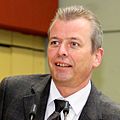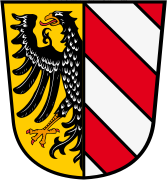Local election in Nuremberg 2014
The municipal elections in Nuremberg in 2014 took place on March 16, 2014 , as in all of Bavaria . In addition to the Lord Mayor of Nuremberg, the City Council of Nuremberg was also elected.
Starting position
In the local elections in Nuremberg in 2008 , the turnout for 368,110 voters was 49.5%. For mayor was 64.3% Ulrich Maly selected. The strongest faction in the Nuremberg City Council was the SPD with 43.2% of the votes (32 seats), ahead of the CSU (32.0%, 23 seats) and the Greens (7.6%, 5 seats). Since there is no 5 percent hurdle in local elections , the following parties are also represented: LINKE (4.8%, 3 seats), BIA (3.3%, 2 seats), FDP (3.2%, 2 seats) ), The Good (2.3%, 1 seat), Free Voters (1.4%, 1 seat), ÖDP (1.1%, 1 seat) and The Republicans (1.0%, 1 seat).
Innovations in the right to vote
In February 2012, the Bavarian State Parliament passed some changes to the municipal and district electoral law that will apply to the 2014 municipal elections. Among other things, postal voting is made easier and eligible voters only need to have lived in the constituency for two months instead of the previous three. An important change is the elimination of the so-called “focus of life relationships”. Up until now it was only possible to elect those who had been the main focus of living in the constituency, here Nuremberg, for at least six months. This clause is now being relaxed. It is now possible to choose who has an apartment in the constituency for at least three years that does not have to be the main residence, or who - without having an apartment - usually stays in the constituency.
Election of the Lord Mayor
In the major district cities of Bavaria , the title of the first mayor, directly elected by the citizens , is “ Lord Mayor ”. The city council in Nuremberg elects the second and third mayor from among its ranks. The incumbent Mayor Ulrich Maly from the SPD was re-elected for the third time in the first ballot with an absolute majority. Christian Vogel (SPD) became second mayor, and Klemens Gsell from CSU became third .
The official final result of the first ballot for the election of the Lord Mayor on March 16, 2014 was as follows:
| Political party | candidate | image | Votes (absolute) | Votes (in percent) |
|---|---|---|---|---|
| SPD | Ulrich Maly |

|
113,881 | 67.1% |
| CSU | Sebastian Brehm |

|
40,934 | 24.1% |
| Left list Nuremberg | Marion Padua | 3,228 | 1.9% | |
| Citizens' initiative to stop foreigners | Ralf Ollert | 2,933 | 1.7% | |
| GREEN | Achim Mletzko | 2,873 | 1.7% | |
| Free voters | Jürgen Dörfler | 2,028 | 1.2% | |
| ÖDP | Thomas Schrollinger | 1,678 | 1.0% | |
| FDP | Christiane Alberternst | 1,094 | 0.6% | |
| The good ones | Nikolaus Struck | 1,027 | 0.6% |
Election of the city council
As usual in local government , the Nuremberg city councils are volunteers. The professional city councils (referred to in Nuremberg as heads of the respective departments as speakers ) are directly elected by the city council for 6 years. You are a member of the city council and have the right to speak but not to vote. As a rule, the elections for the speakers in Nuremberg take place shortly before the next local elections.
The Nuremberg City Council consists of 70 members. Since there is no 5 percent hurdle , it is possible to get a seat with around 1.0% of the votes cast. In contrast to the federal and state level, election polls are rarely carried out at the municipal level. Therefore it was not possible to reflect the current mood in Nuremberg.
Each voter has as many votes as the city council has seats. In the local elections in Bavaria, voters can cumulate and variegate . Each eligible voter has 70 votes, which corresponds to the number of city council members to be elected. It is possible to give a candidate up to three votes. Candidates from different party lists can also be elected, but the total number of 70 votes must not be exceeded. It is also possible to tick an entire party list, with each candidate on the list receiving one vote. Candidates can also be removed from the checked list.
New seat allocation procedure
In 2010 the Bavarian State Parliament decided that local elections should no longer be counted according to the d'Hondt system , but according to Hare / Niemeyer . This prevents small parties and groups from being disadvantaged. Already 0.7 to 0.9% are now enough to win the first seat.
The ÖDP and the Free Voters in particular benefited from the new seat allocation procedure . According to the old d'Hondt procedure, around 1.43% of the votes were required for a seat (100% = 70 seats). This value was roughly reached for the larger parties. One seat in the Greens corresponds to approx. 1.5% of the votes, in the CSU 1.55% or in the SPD 1.37%.
According to Hare-Niemeyer, the number of party votes is multiplied by the number of seats and divided by the total number of votes. The result is a quota with decimal places. The results of all lists are rounded down to a whole number and the seats are assigned accordingly.
The remaining seats were allocated in the order of the highest number of decimal places in the quotas.
Election result
Official final result after counting all 495 voting areas:
| Political party | Votes (absolute) |
Votes (in percent) |
Change compared to 2008 (in percentage points) |
Seats |
|---|---|---|---|---|
| SPD | 4,730,465 | 44.1% | + 0.9% | 32 |
| CSU | 3,156,184 | 32.6% | −2.6% | 21st |
| GREEN | 967,607 | 9.0% | +1.4% | 6th |
| Left list Nuremberg | 443.770 | 4.1% | −0.7% | 3 |
| Citizens' initiative to stop foreigners | 332,468 | 3.1% | −0.2% | 2 |
| Free voters | 297.213 | 2.8% | +1.4% | 2 |
| ÖDP | 223,525 | 2.1% | +1.0% | 2 |
| FDP | 216.038 | 2.0% | −1.2% | 1 |
| The good ones | 186,677 | 1.7% | −0.6% | 1 |
| Pirate party | 180.502 | 1.7% | not started | 1 |
| Invalid ballot | 3 830 | 2.2% | −0.1% | - |
- Allocation of seats in the Nuremberg City Council since 1946 at the beginning of each legislative period

Postal vote
For all elections, the citizens of Nuremberg can apply for the postal voting documents online before they receive the voting notification.
See also
- Local elections in Bavaria 2014
- Results of the local elections in Nuremberg
- Local electoral law (Bavaria)
- Administrative division of Bavaria
- List of mayors of the city of Nuremberg
Web links
- City of Nuremberg: Results of the 2014 local elections - 2014 election results
- City of Nuremberg: Elections in Nuremberg - election results and announcements
- City of Nuremberg: Local election in Nuremberg - information and results
- Nürnberger Nachrichten : 2014 Local Elections in Nuremberg - Article on the subject
Individual evidence
- ^ Official final result of the city council election of March 2, 2002 City of Nuremberg.
- ↑ Results of the Nuremberg City Council election 2008. Accessed on June 14, 2019 .
- ↑ Result of the mayoral election 2014. Accessed on June 13, 2019 .
- ↑ No later election: Small parties flash off in the city council. April 11, 2019, accessed June 13, 2019 .
- ^ "Bill to amend the Municipal and District Election Act and the District Election Act". (PDF) Retrieved June 14, 2019 .
- ↑ Better chances for splinter parties. May 4, 2013, accessed June 14, 2019 .
- ^ Official final result of the city council election of March 2, 2002 City of Nuremberg.
- ↑ City council election on March 16, 2014 - preliminary results. (PDF) March 17, 2014, accessed June 14, 2019 .



